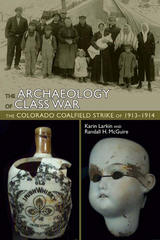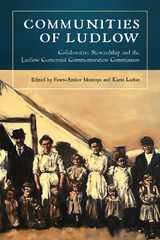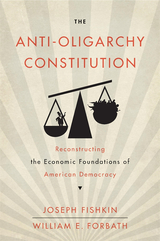2 books by Larkin, Karin

The Archaeology of Class War
The Colorado Coalfield Strike of 1913-1914
Karin Larkin
University Press of Colorado, 2009
The Archaeology of the Colorado Coalfield War Project has conducted archaeological investigations at the site of the Ludlow Massacre in Ludlow, Colorado, since 1996. With the help of the United Mine Workers of America and funds from the Colorado State Historical Society and the Colorado Endowment for the Humanities, the scholars involved have integrated archaeological finds with archival evidence to show how the everyday experiences of miners and their families shaped the strike and its outcome.The Archaeology of Class War weaves together material culture, documents, oral histories, landscapes, and photographs to reveal aspects of the strike and life in early twentieth-century Colorado coalfields unlike any standard documentary history. Excavations at the site of the massacre and the nearby town of Berwind exposed tent platforms, latrines, trash dumps, and the cellars in which families huddled during the attack. Myriad artifacts—from canning jars to a doll’s head—reveal the details of daily existence and bring the community to life.The Archaeology of Class War will be of interest to archaeologists, historians, and general readers interested in mining and labor history.
[more]

Communities of Ludlow
Collaborative Stewardship and the Ludlow Centennial Commemoration Commission
Fawn-Amber Montoya
University Press of Colorado, 2021
For more than one hundred years, people have come to the Ludlow Massacre Memorial site to remember the dead, to place themselves within a larger narrative of labor history, and to learn about what occurred there. Communities of Ludlow reveals the perseverance, memory, and work that has been done to enrich and share the narratives of the people of Ludlow and the experiences of those who commemorate it.
The history of the Ludlow Massacre encompasses the stories of immigrant groups, women, the working-class, and people of color as much as the story of that tragedy, and the continued relevance of these issues creates a need for remembrance and discussion of how to make the events of the Ludlow Massacre available to contemporary society. The book outlines recent efforts to remember and commemorate this important historical event, documenting the unique collaborations in public scholarship and outreach among the diverse group of people involved in marking the 100-year anniversary of the Ludlow Massacre. The chapters relate the tales of the stewards of the Ludlow Massacre—the various communities that rallied together to keep this history alive and show its relevance, including lineal descendants, members of the United Mine Workers of America, historians, archaeologists, scholars, artists, interpreters, authors, playwrights, and politicians. The book also offers tips, strategies, and cautionary tales for practicing engaged public scholarship.
The history of the Ludlow Massacre has been told as a tragedy of striking miners in the West that occurred during a turbulent time in US labor relations, but it is so much more than that. Communities of Ludlow explores the intersections of public scholarship, advocacy, and personal experience, weaving these perspectives together with models for practicing public scholarship to illustrate the power of creating spaces for sharing ideas and information in an environment that encourages creativity, open dialogue, public outreach, political action, and alternative narratives.
Contributors: Robert Butero, Robin Henry, Michael Jacobson, Elizabeth Jameson, Linda Linville, Matthew Maher, Yolanda Romero
The history of the Ludlow Massacre encompasses the stories of immigrant groups, women, the working-class, and people of color as much as the story of that tragedy, and the continued relevance of these issues creates a need for remembrance and discussion of how to make the events of the Ludlow Massacre available to contemporary society. The book outlines recent efforts to remember and commemorate this important historical event, documenting the unique collaborations in public scholarship and outreach among the diverse group of people involved in marking the 100-year anniversary of the Ludlow Massacre. The chapters relate the tales of the stewards of the Ludlow Massacre—the various communities that rallied together to keep this history alive and show its relevance, including lineal descendants, members of the United Mine Workers of America, historians, archaeologists, scholars, artists, interpreters, authors, playwrights, and politicians. The book also offers tips, strategies, and cautionary tales for practicing engaged public scholarship.
The history of the Ludlow Massacre has been told as a tragedy of striking miners in the West that occurred during a turbulent time in US labor relations, but it is so much more than that. Communities of Ludlow explores the intersections of public scholarship, advocacy, and personal experience, weaving these perspectives together with models for practicing public scholarship to illustrate the power of creating spaces for sharing ideas and information in an environment that encourages creativity, open dialogue, public outreach, political action, and alternative narratives.
Contributors: Robert Butero, Robin Henry, Michael Jacobson, Elizabeth Jameson, Linda Linville, Matthew Maher, Yolanda Romero
[more]
READERS
Browse our collection.
PUBLISHERS
See BiblioVault's publisher services.
STUDENT SERVICES
Files for college accessibility offices.
UChicago Accessibility Resources
home | accessibility | search | about | contact us
BiblioVault ® 2001 - 2024
The University of Chicago Press









